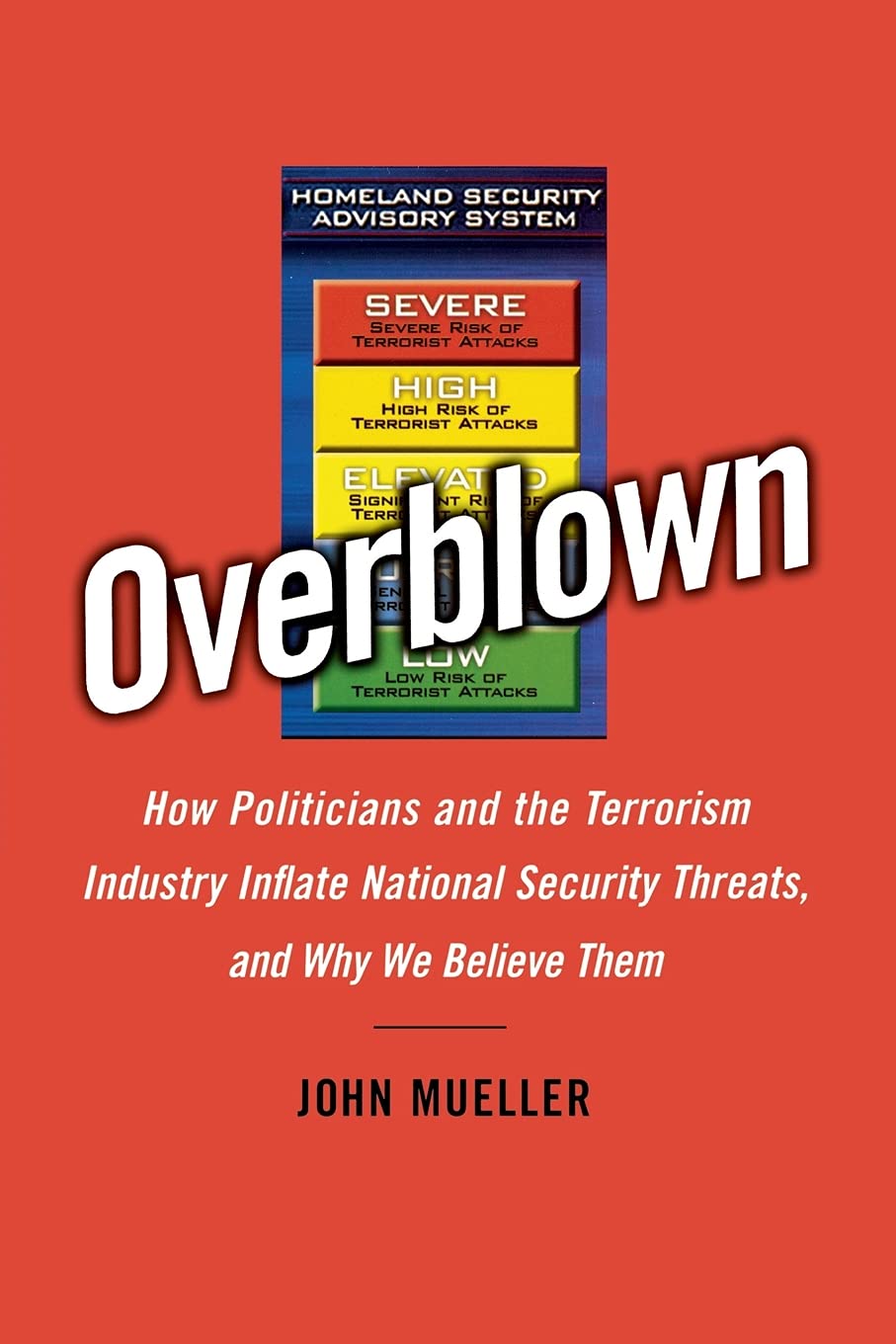Overblown
|
Overblown: How Politicians and the Terrorism Industry Inflate National Security Threats, and Why We Believe Them by John Mueller (2006)
This is an interesting, valuable and important book, and I’m fairly sure almost no-one has or, for that matter will, read it. I will do what I can to change that.
John Mueller is from a venerable but sadly rare tradition of Academic commentators: the skeptics. It’s that perspective he lends to our “troubled times” and over this course of this tidily executed, thoroughly sourced and entertaining book, Mueller systematically demolishes much of the public hype which holds us up in airport terminals, eats up tax dollars and does its level best to prevent the populace sleeping soundly at night.
He makes, and repeats, a point which many otherwise perfectly sensible and well-informed commentators can’t fathom: The biggest source of terror in our lives is not jihadis in Afghan caves, but western politicians and media pundits blathering about them.
The terrorists themselves cause sporadic but, in fact, limited damage.
The thousands of hungry mouths who comprise the “terrorism industry” on the other hand — the politicians, civil servants, defence contractors, security analysts and media commentators — each of whom is primarily interested in justifying his own existence or convincing us to open our wallets — each has a vested interest in persuading us we should be soiling rather than sleeping in our beds. Their statements, therefore, we should take with a pinch of salt.
But even though we all know we ought to, we don’t. We acquiesce: we put up with speculative, unsourced, unattributed, and frequently credulous nonsense — we tolerate queues and being unneccesarily fondled at airports, hikes in tax rates and restrictions on our civil liberties. John Mueller’s book sets out to provide us a reality check and ask, pointedly, why we are so easily prepared to do that.
By way of preface Mueller lists a series of items which ought to be — but aren’t — conventional wisdom. They’re all very big points, among them:
- Terrorism just doesn’t do much damage considered in any reasonable context (nine times as many Americans are struck by lightning in the average year as are killed by terrorists)
- Even where Terrorism has horrendous results, it tends to be one-off events (despite six years [Call that twenty two — Ed] of anxiety, there has not been another terrorist attack in the U.S. at all, let alone one on the scale of 9/11)
- Catastrophic events are by their nature are hard to repeat (never again will a plane full of unsuspecting passengers sit and allow unarmed men to fly them to their deaths without intervening, since the assumption “we’ll be used as hostages so we’re safe for now” no longer holds)
- Terrorist actions tend to be counterproductive on almost every level any way: far from throwing New York into chaos, panic and Hobbesian brutality, the direct result of 9/11 was a sudden blossoming of unprecedented compassion, cooperation and cohesion in the city — a place hardly known for neighbourliness and the Samaritan spirit
- The cost (both human and economic terms) of the “War on Terror” has been far greater than the cost of terrorist actions themselves (even taking into account the financial losses sustained in the capital markets)
- The “War on Terror", being as it is a war on an idea, is unwinnable. There is no practical way of eradicating the possibility of individuals, for whatever reason, engaging in entirely destructive acts of violence. Like road fatalities (of which there are tens of thousands each year in the U.S.) the risk of terrorist attacks are a fact of life in built up areas which we should take reasonable, dispassionate, measures to minimise bearing in mind the opportunity costs of doing so.
Mueller doesn’t take an (overtly) political position — his arguments are not based on views about foreign policy nor the moral rights and wrongs of the situation, but an statistical analysis of the costs and risks of the terrorist threat, and acknowledgment of the personal agendas which inevitably inform those who shout loudest. “If it bleeds it leads” — people don’t buy newspapers to read good news, so in a competitive market it is no surprise if newspapers tend to dwell on worst case scenarios. Yes, terrorism is dreadful, Mueller says, but that doesn’t mean we shouldn’t keep it in perspective.
In short, this book is a long overdue and much needed dose of common sense.
